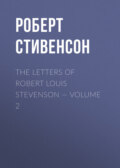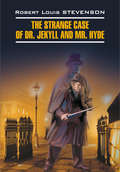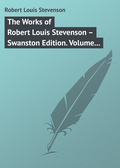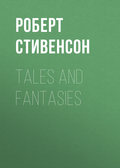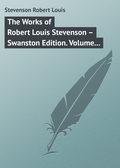
Роберт Льюис Стивенсон
The Works of Robert Louis Stevenson – Swanston Edition. Volume 23
Again, it was characteristic of this multiple personality that he never seemed to be cramped like the rest of us, at any given time of life, within the limits of his proper age, but to be child, boy, young man, and old man all at once. There was never a time in his life when Stevenson had to say with St. Augustine, “Behold! my childhood is dead, but I am alive.” The child lived on always in him, not in memory only, but in real survival, with all its freshness of perception unimpaired, and none of its play instincts in the least degree extinguished or made ashamed. As for the perennial boy in Stevenson, that is too apparent to need remark. It was as a boy for boys that he wrote the best known of his books, Treasure Island, and with all boys that he met, provided they were really boys and not prigs nor puppies, he was instantly and delightedly at home. At the same time, even when I first knew him, he showed already surprising occasional traits and glimpses of old sagacity, of premature life-wisdom and experience.
Once more, it is said that in every poet there must be something of the woman. If to be quick in sympathy and feeling, ardent in attachment, and full of pity for the weak and suffering, is to be womanly, Stevenson was certainly all those; he was even like a woman in being ἀρτίδακρυς, easily moved to tears at the touch of pity or affection, or even at any specially poignant impression of art or beauty. But yet, if any one word were to be chosen for the predominant quality of his character and example, I suppose that word would be manly. In his gentle and complying nature there were strains of iron tenacity and will: occasionally even, let it be admitted, of perversity and Scottish “thrawnness.” He had both kinds of physical courage – the active, delighting in danger, and the passive, unshaken in endurance. In the moral courage of facing situations and consequences, of readiness to pay for faults committed, of outspokenness, admitting no ambiguous relations and clearing away the clouds from human intercourse, I have not known his equal. The great Sir Walter himself, as this book will prove, was not more manfully free from artistic jealousy or irritability under criticism, or more unfeignedly inclined to exaggerate the qualities of other people’s work and to underrate those of his own. Of the humorous and engaging parts of vanity and egoism, which led him to make infinite talk and fun about himself, and use his own experiences as a key for unlocking the confidences of others, Stevenson had plenty; but of the morose and fretful parts never a shade. “A little Irish girl,” he wrote once during a painful crisis of his life, “is now reading my book aloud to her sister at my elbow; they chuckle, and I feel flattered. – Yours, R. L. S. P.S.– Now they yawn, and I am indifferent. Such a wisely conceived thing is vanity.” If only vanity so conceived were commoner! And whatever might be the abstract and philosophical value of that somewhat grimly stoical conception of the universe, of conduct and duty, at which in mature years he had arrived, want of manliness is certainly not its fault. Take the kind of maxims which he was accustomed to forge for his own guidance: – “Acts may be forgiven; not even God can forgive the hanger-back.” “Choose the best, if you can; or choose the worst; that which hangs in the wind dangles from a gibbet.” “’Shall I?’ said Feeble-mind; and the echo said, ‘Fie!’” “’Do I love?’ said Loveless; and the echo laughed.” “A fault known is a fault cured to the strong; but to the weak it is a fetter riveted.” “The mean man doubts, the great-hearted is deceived.” “Great-heart was deceived. ‘Very well,’ said Great-heart.” “’I have not forgotten my umbrella,’ said the careful man; but the lightning struck him.” “Shame had a fine bed, but where was slumber? Once he was in jail he slept.” With this moralist maxims meant actions; and where shall we easily find a much manlier spirit of wisdom than this?
There was yet another and very different side to Stevenson which struck others more than it struck myself, namely, that of the freakish or elvish, irresponsible madcap or jester which sometimes appeared in him. It is true that his demoniac quickness of wit and intelligence suggested occasionally a “spirit of air and fire” rather than one of earth; that he was abundantly given to all kinds of quirk and laughter; and that there was no jest (saving the unkind) he would not make and relish. The late Mr. J. A. Symonds always called him Sprite; qualifying the name, however, by the epithets “most fantastic, but most human.” To me the essential humanity was always the thing most apparent. In a fire well nourished of seasoned ship-timber, the flames glance fantastically and of many colours, but the glow at heart is ever deep and strong; it was at such a glow that the friends of Stevenson were accustomed to warm their hands, while they admired and were entertained by the shifting lights.
It was only in company, as I have said, that all these many lights and colours could be seen in full play. He would begin no matter how – perhaps with a jest at some absurd adventure of his own, perhaps with the recitation, in his vibrating voice and full Scotch accent, of some snatch of poetry that was haunting him, perhaps with a rhapsody of analytic delight over some minute accident of beauty or expressiveness that had struck him in man, woman, child, or external nature. And forthwith the floodgates would be opened, and the talk would stream on in endless, never importunate, flood and variety. A hundred fictitious characters would be invented and launched on their imaginary careers; a hundred ingenious problems of conduct and cases of honour would be set and solved; romantic voyages would be planned and followed out in vision, with a thousand incidents; the possibilities of life and art would be illuminated with search-lights of bewildering range and penetration, sober argument and high poetic eloquence alternating with coruscations of insanely apposite slang – the earthiest jape anon shooting up into the empyrean and changing into the most ethereal fantasy – the stalest and most vulgarised forms of speech gaining brilliancy and illuminating power from some hitherto undreamt-of application – and all the while an atmosphere of goodwill diffusing itself from the speaker, a glow of eager benignity and affectionate laughter emanating from his presence, till every one about him seemed to catch something of his own gift and inspiration. This sympathetic power of inspiring others was the special and distinguishing note of Stevenson’s conversation. He would keep a houseful or a single companion entertained all day, and day after day and half the nights, yet never seemed to monopolise the talk or absorb it; rather he helped every one about him to discover and to exercise unexpected powers of their own.
Imagine all this helped by the most speaking of presences: a steady, penetrating fire in the brown, wide-set eyes, a compelling power and richness in the smile; courteous, waving gestures of the arms and long, nervous hands, a lit cigarette generally held between the fingers; continual rapid shiftings and pacings to and fro as he conversed: rapid, but not flurried nor awkward, for there was a grace in his attenuated but well-carried figure, and his movements were light, deft, and full of spring. There was something for strangers, and even for friends, to get over in the queer garments which in youth it was his whim to wear – the badge, as they always seemed to me, partly of a genuine carelessness, certainly of a genuine lack of cash (the little he had was always absolutely at the disposal of his friends), partly of a deliberate detachment from any particular social class or caste, partly of his love of pickles and adventures, which he thought befel a man thus attired more readily than another. But this slender, slovenly, nondescript apparition, long-visaged and long-haired, had only to speak in order to be recognised in the first minute for a witty and charming gentleman, and within the first five for a master spirit and man of genius. There were, indeed, certain stolidly conventional and superciliously official kinds of persons, both at home and abroad, who were incapable of looking beyond the clothes, and eyed him always with frozen suspicion. This attitude used sometimes in youth to drive him into fits of flaming anger, which put him helplessly at a disadvantage unless, or until, he could call the sense of humour to his help. Apart from these his human charm was the same for all kinds of people, without distinction of class or caste; for worldly-wise old great ladies, whom he reminded of famous poets in their youth; for his brother artists and men of letters, perhaps, above all; for the ordinary clubman; for his physicians, who could never do enough for him; for domestic servants, who adored him; for the English policeman even, on whom he often tried, quite in vain, to pass himself as one of the criminal classes; for the shepherd, the street arab, or the tramp, the common seaman, the beach-comber, or the Polynesian high-chief. Even in the imposed silence and restraint of extreme sickness the power and attraction of the man made themselves felt, and there seemed to be more vitality and fire of the spirit in him as he lay exhausted and speechless in bed than in an ordinary roomful of people in health.
But I have strayed from my purpose, which was only to indicate that in the best of these letters of Stevenson’s you have some echo, far away indeed, but yet the nearest, of his talk – talk which could not possibly be taken down, and of which nothing remains save in the memory of his friends an impression magical and never to be effaced.
Sidney Colvin.
THE LETTERS OF ROBERT LOUIS STEVENSON
1868-1882
I
STUDENT DAYS AT EDINBURGH
TRAVELS AND EXCURSIONS
1868-1873
The following section consists chiefly of extracts from the correspondence and journals addressed by Louis Stevenson, as a lad of eighteen to twenty-two, to his father and mother during summer excursions to the Scottish coast or to the Continent. There exist enough of them to fill a volume; but it is not in letters of this kind to his family that a young man unbosoms himself most freely, and these are perhaps not quite devoid of the qualities of the guide-book and the descriptive exercise. Nevertheless they seem to me to contain enough signs of the future master-writer, enough of character, observation, and skill in expression, to make a certain number worth giving by way of an opening chapter to the present book. Among them are interspersed four or five of a different character addressed to other correspondents, and chiefly to his lifelong friend and intimate, Mr. Charles Baxter.
On both sides of the house Stevenson came of interesting stock. His grandfather was Robert Stevenson, civil engineer, highly distinguished as the builder of the Bell Rock lighthouse. By this Robert Stevenson, his three sons, and two of his grandsons now living, the business of civil engineers in general, and of official engineers to the Commissioners of Northern Lights in particular, has been carried on at Edinburgh with high credit and public utility for almost a century. Thomas Stevenson, the youngest of the three sons of the original Robert, was Robert Louis Stevenson’s father. He was a man not only of mark, zeal, and inventiveness in his profession, but of a strong and singular personality; a staunch friend and sagacious adviser, trenchant in judgment and demonstrative in emotion, outspoken, dogmatic, – despotic, even, in little things, but withal essentially chivalrous and soft-hearted; apt to pass with the swiftest transition from moods of gloom or sternness to those of tender or freakish gaiety, and commanding a gift of humorous and figurative speech second only to that of his more famous son.
Thomas Stevenson was married to Margaret Isabella, youngest daughter of the Rev. Lewis Balfour, for many years minister of the parish of Colinton in Midlothian. This Mr. Balfour (described by his grandson in the essay called The Manse) was of the stock of the Balfours of Pilrig, and grandson to that James Balfour, professor first of moral philosophy and afterwards of the law of nature and of nations, who was held in particular esteem as a philosophical controversialist by David Hume. His wife, Henrietta Smith, a daughter of the Rev. George Smith of Galston, to whose gift as a preacher Burns refers scoffingly in the Holy Fair, is said to have been a woman of uncommon beauty and charm of manner. Their daughter, Mrs. Thomas Stevenson, suffered in early and middle life from chest and nerve troubles, and her son may have inherited from her some of his constitutional weakness. Capable, cultivated, companionable, affectionate, she was a determined looker at the bright side of things, and hence better skilled, perhaps, to shut her eyes to troubles or differences among those she loved than understandingly to compose or heal them. Conventionally minded one might have thought her, but for the surprising readiness with which in later life she adapted herself to conditions of life and travel the most unconventional possible. The son and only child of these two, Robert Louis (baptized Robert Lewis Balfour3), was born on November 13, 1850, at 8 Howard Place, Edinburgh. His health was infirm from the first, and he was with difficulty kept alive by the combined care of his mother and a most devoted nurse, Alison Cunningham; to whom his lifelong gratitude will be found touchingly expressed in the course of the following letters. In 1858 he was near dying of a gastric fever, and was at all times subject to acute catarrhal and bronchial affections and extreme nervous excitability.
In January 1853 Stevenson’s parents moved to Inverleith Terrace, and in May 1857 to 17 Heriot Row, which continued to be their Edinburgh home until the death of Thomas Stevenson in 1887. Much of the boy’s time was also spent in the manse of Colinton on the Water of Leith, the home of his maternal grandfather. Ill-health prevented him getting much regular or continuous schooling. He attended first (1858-61) a preparatory school kept by a Mr. Henderson in India Street; and next (at intervals for some time after the autumn of 1861) the Edinburgh Academy.
Schooling was interrupted in the end of 1862 and first half of 1863 by excursions with his parents to Germany, the Riviera, and Italy. The love of wandering, which was a rooted passion in Stevenson’s nature, thus began early to find satisfaction. For a few months in the autumn of 1863, when his parents had been ordered for a second time to Mentone for the sake of his mother’s health, he was sent to a boarding-school kept by a Mr. Wyatt at Spring Grove, near London. It is not my intention to treat the reader to the series of childish and boyish letters of these days which parental fondness has preserved. But here is one written from his English school when he was about thirteen, which is both amusing in itself and had a certain influence on his destiny, inasmuch as his appeal led to his being taken out to join his parents on the French Riviera; which from these days of his boyhood he never ceased to love, and for which the longing, amid the gloom of Edinburgh winters, often afterwards gripped him by the heart.
Spring Grove School, 12th November 1863.
MA CHERE MAMAN, – Jai recu votre lettre Aujourdhui et comme le jour prochaine est mon jour de naisance je vous écrit ce lettre. Ma grande gatteaux est arrivé il leve 12 livres et demi le prix etait 17 shillings. Sur la soirée de Monseigneur Faux il y etait quelques belles feux d’artifice. Mais les polissons entrent dans notre champ et nos feux d’artifice et handkerchiefs disappeared quickly, but we charged them out of the field. Je suis presque driven mad par une bruit terrible tous les garcons kik up comme grand un bruit qu’il est possible. I hope you will find your house at Mentone nice. I have been obliged to stop from writing by the want of a pen, but now I have one, so I will continue.
My dear papa, you told me to tell you whenever I was miserable. I do not feel well, and I wish to get home. Do take me with you.
R. Stevenson.
This young French scholar has yet, it will be discerned, a good way to travel; in later days he acquired a complete reading and speaking, with a less complete writing, mastery of the language, and was as much at home with French ways of thought and life as with English.
For one more specimen of his boyish style, it may be not amiss to give the text of another appeal which dates from two and a half years later, and is also typical of much in his life’s conditions both then and later: —
2 Sulgarde Terrace, Torquay, Thursday [April 1866].
RESPECTED PATERNAL RELATIVE, – I write to make a request of the most moderate nature. Every year I have cost you an enormous – nay, elephantine – sum of money for drugs and physician’s fees, and the most expensive time of the twelve months was March.
But this year the biting Oriental blasts, the howling tempests, and the general ailments of the human race have been successfully braved by yours truly.
Does not this deserve remuneration?
I appeal to your charity, I appeal to your generosity, I appeal to your justice, I appeal to your accounts, I appeal, in fine, to your purse.
My sense of generosity forbids the receipt of more – my sense of justice forbids the receipt of less – than half-a-crown. – Greeting from, Sir, your most affectionate and needy son,
R. Stevenson.
From 1864 to 1867 Stevenson’s education was conducted chiefly at Mr. Thomson’s private school in Frederick Street, Edinburgh, and by private tutors in various places to which he travelled for his own or his parents’ health. These travels included frequent visits to such Scottish health resorts as Bridge of Allan, Dunoon, Rothesay, North Berwick, Lasswade, and Peebles, and occasional excursions with his father on his nearer professional rounds to the Scottish coasts and lighthouses. From 1867 the family life became more settled between Edinburgh and Swanston Cottage, Lothianburn, a country home in the Pentlands which Mr. Stevenson first rented in that year, and the scenery and associations of which sank deeply into the young man’s spirit, and vitally affected his after thoughts and his art.
By this time Louis Stevenson seemed to show signs of outgrowing his early infirmities of health. He was a lover, to a degree even beyond his strength, of outdoor life and exercise (though not of sports), and it began to be hoped that as he grew up he would be fit to enter the family profession of civil engineer. He was accordingly entered as a student at Edinburgh University, and for several winters attended classes there with such regularity as his health and inclinations permitted. This was in truth but small. The mind on fire with its own imaginations, and eager to acquire its own experiences in its own way, does not take kindly to the routine of classes and repetitions, nor could the desultory mode of schooling enforced upon him by ill-health answer much purpose by way of discipline. According to his own account he was at college, as he had been at school, an inveterate idler and truant. But outside the field of school and college routine he showed an eager curiosity and activity of mind. “He was of a conversable temper,” so he says of himself, “and insatiably curious in the aspects of life, and spent much of his time scraping acquaintance with all classes of men and womenkind.” Of one class indeed, and that was his own, he had soon had enough, at least in so far as it was to be studied at the dinners, dances, and other polite entertainments of ordinary Edinburgh society. Of these he early wearied. At home he made himself pleasant to all comers, but for his own resort chose out a very few houses, mostly those of intimate college companions, into which he could go without constraint, and where his inexhaustible flow of poetic, imaginative, and laughing talk seems generally to have rather puzzled his hearers than impressed them. On the other hand, during his endless private rambles and excursions, whether among the streets and slums, the gardens and graveyards of the city, or farther afield among the Pentland hills or on the shores of Forth, he was never tired of studying character and seeking acquaintance among the classes more nearly exposed to the pinch and stress of life.
In the eyes of anxious elders, such vagrant ways naturally take on the colours of idleness and a love of low company. Stevenson was, however, in his own fashion an eager student of books as well as of man and nature. He read precociously and omnivorously in the belles-lettres, including a very wide range of English poetry, fiction, and essays, and a fairly wide range of French; and was a genuine student of Scottish history, especially from the time of the persecutions down, and to some extent of history in general. The art of literature was already his private passion, and something within him even already told him that it was to be his life’s work. On all his truantries he went pencil and copybook in hand, trying to fit his impression of the scene to words, to compose original rhymes, tales, dialogues, and dramas, or to imitate the style and cadences of the author he at the moment preferred. For three or four years, nevertheless, he tried dutifully, if half-heartedly, to prepare himself for the family profession. In 1868, the year when the following correspondence opens, he went to watch the works of the firm in progress first at Anstruther on the coast of Fife, and afterwards at Wick. In 1869 he made the tour of the Orkneys and Shetlands on board the steam yacht of the Commissioners of Northern Lights, and in 1870 the tour of the Western Islands, preceded by a stay on the isle of Earraid, where the works of the Dhu Heartach lighthouse were then in progress. He was a favourite, although a very irregular, pupil of the professor of engineering, Fleeming Jenkin, whose friendship and that of Mrs. Jenkin were of great value to him, and whose life he afterwards wrote; and must have shown some aptitude for the family calling, inasmuch as in 1871 he received the silver medal of the Edinburgh Society of Arts for a paper on a suggested improvement in lighthouse apparatus. The outdoor and seafaring parts of an engineer’s life were in fact wholly to his taste. But he looked instinctively at the powers and phenomena of waves and tide, of storm and current, reef, cliff, and rock, with the eye of the poet and artist, and not those of the practician and calculator. For desk work and office routine he had an unconquerable aversion; and his physical powers, had they remained at their best, must have proved quite unequal to the workshop training necessary to the practical engineer. Accordingly in 1871 it was agreed, not without natural reluctance on his father’s part, that he should give up the hereditary vocation and read for the bar: literature, on which his heart was set, and in which his early attempts had been encouraged, being held to be by itself no profession, or at least one altogether too irregular and undefined. For the next several years, therefore, he attended law classes instead of engineering and science classes in the University, giving to the subject a certain amount of serious, although fitful, attention until he was called to the bar in 1875.
So much for the course of Stevenson’s outward life during these days at Edinburgh. To tell the story of his inner life would be a far more complicated task, and cannot here be attempted even briefly. The ferment of youth was more acute and more prolonged in him than in most men even of genius. In the Introduction I have tried to give some notion of the many various strains and elements which met in him, and which were in these days pulling one against another in his half-formed being, at a great expense of spirit and body. Add the storms, which from time to time attacked him, of shivering repulsion from the climate and conditions of life in the city which he yet deeply and imaginatively loved; the moods of spiritual revolt against the harsh doctrines of the creed in which he had been brought up, and to which his parents were deeply, his father even passionately, attached; the seasons of temptation, to which he was exposed alike by temperament and circumstance, to seek solace among the crude allurements of the city streets.
In the later and maturer correspondence which will appear in these volumes, the agitations of the writer’s early days are often enough referred to in retrospect. In the boyish letters to his parents, which make up the chief part of this first section, they naturally find no expression at all; nor will these letters be found to differ much in any way from those of any other lively and observant lad who is also something of a reader and has some natural gift of writing. At the end of the section I have indeed printed one cry of the heart, written not to his parents, but about them, and telling of the strain which matters of religious difference for a while brought into his home relations. The attachment between the father and son from childhood was exceptionally strong. But the father was staunchly wedded to the hereditary creeds and dogmas of Scottish Calvinistic Christianity; while the course of the young man’s reading, with the spirit of the generation in which he grew up, had loosed him from the bonds of that theology, and even of dogmatic Christianity in general, and had taught him to respect all creeds alike as expressions of the cravings and conjectures of the human spirit in face of the unsolved mystery of things, rather than to cling to any one of them as a revelation of ultimate truth. The shock to the father was great when his son’s opinions came to his knowledge; and there ensued a time of extremely painful discussion and private tension between them. In due time this cloud upon a family life otherwise very harmonious and affectionate passed quite away. But the greater the love, the greater the pain; when I first knew Stevenson this trouble gave him no peace, and it has left a strong trace upon his mind and work. See particularly the parable called “The House of Eld,” in his collection of Fables, and the many studies of difficult paternal and filial relations which are to be found in The Story of a Lie, The Misadventures of John Nicholson, The Wrecker, and Weir of Hermiston.



